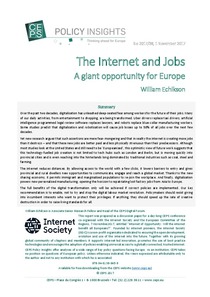The Internet and jobs: a giant opportunity for Europe
"Over the past two decades, digitalisation has unleashed deep-seated fear among workers for the future of their jobs. Many of our daily activities, from entertainment to shopping, are being transformed. Uber drivers replace taxi drivers, artificial intelligence programmed legal review software...
| Main Author: | |
|---|---|
| Institution: | ETUI-European Trade Union Institute |
| Format: | TEXT |
| Language: | English |
| Published: |
Brussels
2017
CEPS |
| Subjects: | |
| Online Access: | https://www.labourline.org/KENTIKA-19397126124911153089-The-internet-and-jobs-a-giant-.htm |
| Summary: | "Over the past two decades, digitalisation has unleashed deep-seated fear among workers for the future of their jobs. Many of our daily activities, from entertainment to shopping, are being transformed. Uber drivers replace taxi drivers, artificial intelligence programmed legal review software replaces lawyers, and robots replace blue-collar manufacturing workers. Some studies predict that digitalisation and robotisation will cause job losses up to 50% of all jobs over the next few decades.
Yet new research argues that such assertions are mere fear-mongering and that in reality the internet is creating more jobs than it destroys – and that these new jobs are better paid and less physically strenuous than their predecessors. Although most studies look at the United States and still need to be ‘Europeanised’, this optimistic view of future work suggests that this technology-fuelled job creation is not limited to tech hubs such as London and Berlin, but is moving quickly into provincial cities and is even reaching into the hinterlands long dominated by traditional industries such as coal, steel and farming.
The internet reduces distances. By allowing access to the world with a few clicks, it lowers barriers to entry and gives provincial and rural dwellers new opportunities to communicate, engage and reach a global market. Thanks to the new sharing economy, it permits immigrant and marginalised populations to re-join the workplace. And finally, digitalisation powers new personalised manufacturing, opening the horizon to repatriating lost factory jobs from Asia to Europe.
The full benefits of the digital transformation only will be achieved if correct policies are implemented. Our key recommendation is to enable, not to try and stop, the digital labour market revolution. Policymakers should resist giving into incumbent interests who want to protect their privileges. If anything, they should speed up the rate of creative destruction in order to raise living standards for all." |
|---|---|
| Physical Description: | 14 p. Digital |

